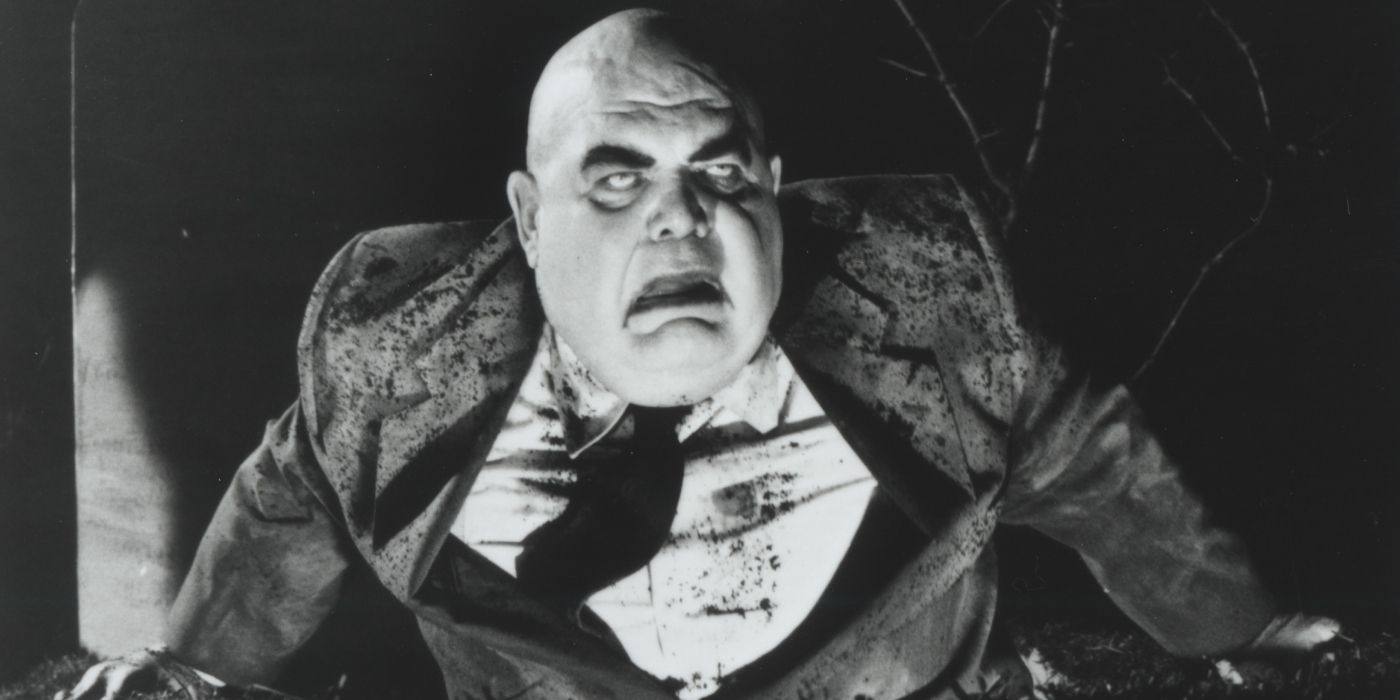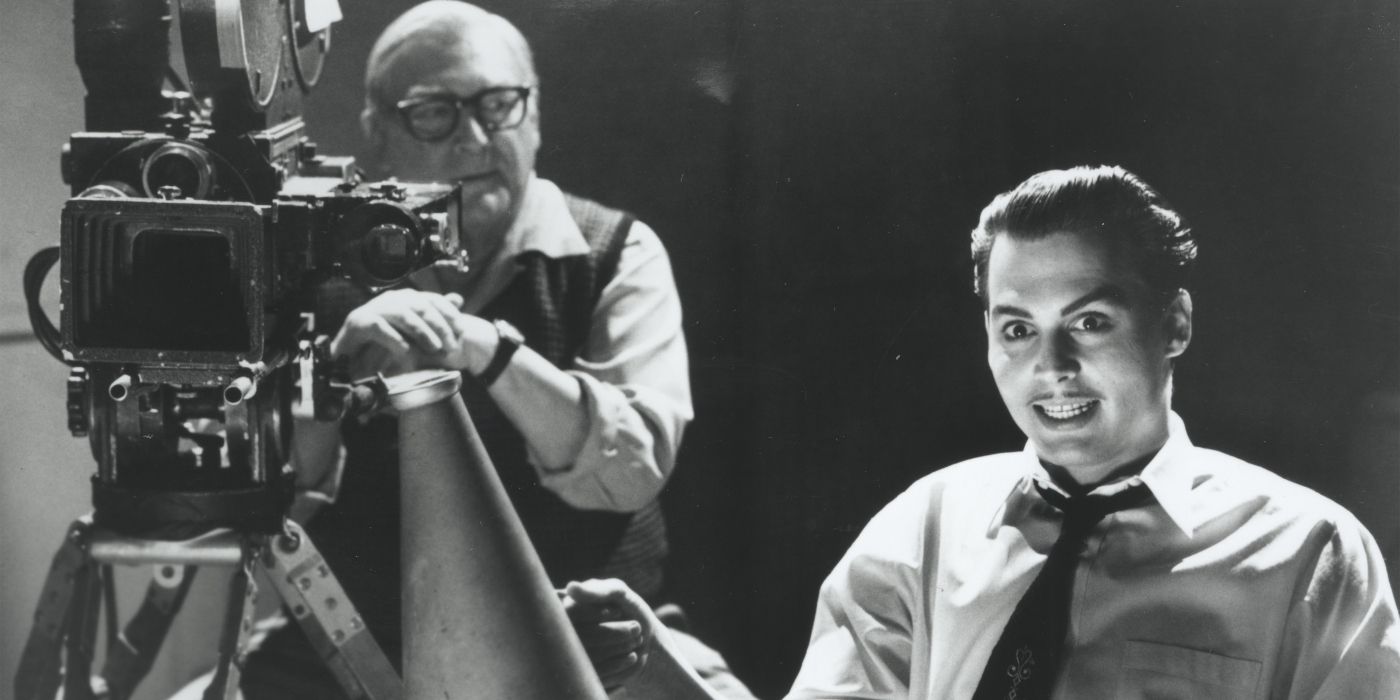[ad_1]
The evolution of Tim Burton‘s directing legacy has been one of great consternation and aggravation, as he’s long been accused of totally losing his touch for most of the 21st century. While the pitfalls are notorious, that argument willfully ignores the notion that any of his inherent artistic vision is present in even his worst films. In fact, one of his best films speaks to the inherent respect owed to the miraculous birth of all films, even the terrible ones. With Ed Wood, Burton showed genuine respect to the alleged “worst director of all time” and, in the process, made one of the truly great films about the perils and highs of filmmaking.
‘Ed Wood’ Paints Wood As a Naïve Yet Optimistic Hustler
Edward D Wood, Jr. (Johnny Depp) is that rare combination: a dreamer and a doer in equal measures. While trying to make the move from small-scale theater director to feature film director, he lies awake at night hoping to be able to make his masterpiece soon, since he’s now 30 and Orson Welles was 26 when he made Citizen Kane. Theater critics regularly trash him and say he has no talent, but none of that ever gets to him, as he’s delusionally committed to focusing on the positives of every situation. When Ed happens to meet and befriend faded horror icon Bela Lugosi (Martin Landau), Ed woos him back into the limelight by promising him renewed fame and desperately needed money. Now that he has a legit movie star in his corner, he goes to a sleazy studio and insists that he can make a quick and easy profit for them with his speedy filmmaking, and the stars may have finally aligned for his dream to come true.
While Ed may have many skills and talents, artistic competence isn’t one of those, and the greatest strength of the film is in how it radically acknowledges Ed’s vast shortcomings, yet never overtly points them out or mocks him for his flaws. It makes no apologies for how hyperfocused he is on just getting the job done, and how much he puts the onus on his audience to suspend disbelief and not notice his numerous mistakes, his shortsighted and often stupid broken promises for the sake of getting his films made. It does, however, convince you of how totally in love he is with his identity as an artist and with every step of the creative process. He’s willing to break laws, lie straight to the faces of his closest allies, and greatly exaggerate his credentials, but he’ll do it all with an eager smile plastered across his face and a flop-sweaty seller’s glare in his eyes. Watch him watch his own scenes play out in front of him with an enraptured trance on his face, and you’ll see a man fully transcend his body and buy into his own hype with religious zealotry. Even when other people openly laugh at him or denigrate his work as awful, he usually bounces right back on his feet and barrels ahead, his confidence far outsizing his acumen.
Tim Burton Respects Ed Wood’s Authenticity and Efficiency
Tim Burton’s films are often acclaimed for how autobiographical they can get, with his penchant for throwing in details and visual nuggets that call back to his own life. Tim and Ed may have led very different lives, and Tim has never been called among the worst filmmakers ever, but Tim clearly holds a deep affection and respect for how Ed puts his core self in his movies. Even when he knows he’s making a film for a cheap studio with no artistic integrity, he’s compelled to make the film on his own terms with the story material. For instance, a good chunk of the film is devoted to his secret love for wearing women’s clothing, and how that interacts with his artistic life. He believes that his predilection makes him perfect to make a film about a transgender woman, and when he writes the script for what will become one of his most infamous films, Glen or Glenda, he incorporates his own internal dialogue about how he internalizes his need to hide it publicly and the arguments he’s had about it with his wife, Dolores (Sarah Jessica Parker). Dolores is used as a representative for mainstream society, who regularly berates and shames Ed for his secret double life and constantly screams about his films being awful, but that only encourages Ed to be more public about it in both his art and when he’s on set. In Burton’s vision, Ed flaunting his private desires in his art is an admirable middle finger to the tastes of mainstream America that should be celebrated.
Another aspect of Ed Wood’s approach to filmmaking that Burton appreciates is his efficiency and his drive to get any idea of his on the screen. If he sees an entire reel of unused stock footage, no matter how disconnected they are from each other, he’ll instantly have ideas about how to incorporate each of them into one cohesive plot. If he doesn’t have a permit for a location, he’ll guerrilla shoot the necessary footage and bolt when the cops show up. If his lead actor literally dies, he’ll just get a lookalike replacement to finish the scenes and make sure the actor’s face is barely visible. For all his lacking in taste or self-assessment, he has a remarkable ingenuity for what his film needs at any given moment, damn the consequences or logic. To Ed, the spark of invention and creating ideas out of thin air is worth more than whether any of them truly make sense or fit together. There’s no other reason he would witness Tor Johnson (George Steele) unintentionally bang into a doorframe in the middle of a take and insist it fits by rationalizing that an undead man would have to deal with that on a daily basis, actually. As narcissistic as it may be, Ed genuinely believes all of his ideas are amazing ideas, and Burton sees no reason to burst the bubble of a man so overflowing with the joy of artistic inspiration.
‘Ed Wood’ Shows All Filmmaking Deserves Respect, Even Terrible Filmmaking
Admittedly, many a great film about filmmaking has already espoused the grand dreams of self-important artists, the drive to do anything to get a shot, the way artists put themselves into art in a way that’s vulnerable and empathetic. What sets Ed Wood apart is the way it imparts nobility and honor upon an artist who, by all accounts, shouldn’t deserve any of it, based on his output. We love to lionize the “great” artists, make statues of the game-changers who permanently altered the way we think of cinema today, and make every day of shooting seem like a bloody gladiator fight for truth. Edward D. Wood, Jr. made trite and poorly thought out yarns that barely qualified as feature films, and Ed Wood fully embraces that and still demands that he be respected. It constantly, yet silently, points out the ways in which he’s clearly incompetent, like how Ed can’t recognize when a production is terrible, or is shortsighted enough to hire a color-blind cinematographer, but is still worthy of praise for getting his films made. There is not an ounce of snark or irony in how the film celebrates Ed’s glee at people clapping for his premiere of his disasterpiece Plan 9 From Outer Space, and shares in his joy that it’s the film he’ll be remembered for. When an irate financier asks Ed if he knows anything about filmmaking, and he responds “well, I’d like to think so,” you feel that the film is sharing in Ed’s indignation.
This sentiment is best captured in one of the best scenes of the film, when Ed implausibly meets his idol, Orson Welles (Vincent D’Onofrio), in a bar. Ed, at this point, is beyond frustrated by moronic producers forcing him to include things in his films just to placate their ego, and he bristles at their encroaching on his vision. Welles listens to him with genuine sympathy, giving Ed a rousing speech about how he shouldn’t be too beaten down by them, and that keeping his vision intact is always worth it. On paper, this is a comedy sketch, the idea that the reigning “greatest filmmaker alive” would talk with the “worst filmmaker alive,” let alone that Welles would treat Ed like someone of equal merit. But not only is Welles’ speech sincere, Burton buttresses it with Howard Shore‘s lush score that makes Welles feel like George Patton rousing his troops, and the framing of it as the gratification Ed needs to complete his “masterpiece” smashes the binary supposition that “good” art should be respected while “bad” art should be disrespected. No matter the outcome or reception, filmmaking is an insanely strenuous and intangible process that’s wildly unpredictable, and getting a film made at all is impressive. Ed Wood sets itself apart as one of the great films about filmmaking not simply for its profile of Ed as an artist we can find genuine admiration in, but in granting unapologetic grace and appreciation for the efforts it took to make some of the worst films ever made. This film argues that if we truly knew how much effort it took to get any one film made, we should stand up and applaud every film that we see, regardless of its quality.
Ed Wood is currently available to buy or rent on Prime Video in the U.S.
[ad_2]
Source link






